Steve Bull's Blog, page 95
October 24, 2023
Debt, Currency Debasement & War—The Timeless Pillars of Failure
Below, we follow the breadcrumbs of simple math and bond market signals toward an oft-repeated pattern of how once-great nations become, well…not so great any more.
Debt Destroys Nations
Debt, once it passes the Rubicon from extreme to just plain madness, destroys nations.
Just ask the former Spanish, British or Dutch empires. Or ask the inter-war Germans. Ask the Yugoslavians of the 1990’s or ask a historian of Ancient Rome or a merchant in modern Argentina.
It’s all pretty much the same story, just different a different stage or curtain call.
Like Hemingway’s description of poverty, the process begins slowly at first, and then all at once.
Part of this process involves currency debasement needed to pay down more desperate issuance of IOUs, a process evidenced by rising rather than “transitory” inflation.
Thereafter, comes increased social unrest, and hence increased centralization from the political left or right in the name of “what’s best for us.”
Sound familiar?
Centralization—The Last, Failed Act
Centralization never works in the long run, but that has never stopped opportunists from trying.
Just look at our central bankers.
In a centralized rather than free market, the very name “central bank” should be a dead give-away as to their real role and profile.
As private central banks have been slowly increasing their hidden power and control over national markets and hence national welfare, the very notion of free price discovery in bonds, and indirectly in stocks, is now all but an extinct financial creature in the neo-feudalism which long ago replaced genuine capitalism.
How the Central Game is Played—From Temporary Prosperity to Permanent Ruin
When central banks like the Fed repress rates and print gobs and gobs of money, bonds are artificially supported, which means their prices go up and their yields are compressed.
…click on the above link to read the rest…
Today’s Contemplation: Collapse Cometh XXI–Loss of Trust in Government: A Stage of Collapse
June 16, 2021
 Tulum, Mexico (1986) Photo by author
Tulum, Mexico (1986) Photo by authorLoss of Trust in Government: A Stage of Collapse
Today’s contemplation is prompted by an online media article that argues for cancelling Canada Day, our national ‘celebration’ for the day the nation state of Canada was ‘born’ (July 1, 1867). I raise this topic for the growing sense of ‘disappointment’ with our national government and, more generally, of all government/politicians. A feeling that seems to be fairly widespread around the globe and, of course, waxes and wanes depending on media attention and events.
I am thinking of this loss of ‘trust’ within the framework of Dmitry Orlov’s thesis of societal ‘collapse’ that is presented in his book The Five Stages of Collapse: Survivor’s Toolkit.
Orlov argues that “my five stages of collapse…serve as mental milestones…[and each breaches] a specific level of trust or faith in the status quo. Although each stage causes physical, observable changes in the environment, these can be gradual, while the mental flip is generally quite swift” (p. 14).
Here are his five stages:
a) Financial collapse where faith in risk assessment and financial guarantees is lost.
b) Commercial collapse that witnesses a breakdown in trade and widespread shortages of necessities.
c) Political collapse through a loss of political class relevance and legitimacy.
d) Social collapse in which social institutions that could provide resources fail.
e) Cultural collapse that is exhibited by the disbanding of families into individuals competing for scarce resources.
The concept of the ‘nation state’ and how the ‘patriotism’ one feels towards it is manipulated by the-powers-that-be/elite/ruling class are interesting sociological/psychological areas to explore and reflect upon. One of the more interesting books/essays I have read about the ‘State’ is Murray Rothbard’s Anatomy of the State. This particular section has stuck with me:
“The State is almost universally considered an institution of social service…[and that] we are the government…[But] the government is not ‘us.’ The government does not in any accurate sense ‘represent’ the majority of the people…Briefly, the State is that organization in society which attempts to maintain a monopoly of the use of force and violence in a given territorial area…Having used force and violence to obtain its revenue, the State generally goes on to regulate and dictate other actions of its individual subjects…[Moreover, the] State provides a legal, orderly, systematic channel for the predation of private property; it renders certain, secure, and relatively ‘peaceful’ the lifeline of the parasitic caste in society…The State has never been created by a ‘social contract’; it has always been born in conquest and exploitation…While force is their modus operandi, their basic and long-run problem is ideological. For in order to continue in office, any government (not simply a ‘democratic’ government) must have the support of the majority of its subjects…[Thus] the chief task of the rulers is always to secure the active or resigned acceptance of the majority of the citizens…For this essential acceptance, the majority must be persuaded by ideology that their government is good, wise and, at least, inevitable, and certainly better than other conceivable alternatives…Since most men tend to love their homeland, the identification of that land and its people with the State was a means of making natural patriotism work to the State’s advantage.”
The ‘State’ works hard to legitimise its position and power (their primary motivation being the control/expansion of the wealth-generating systems that provide their revenue streams). For the most part, it ‘controls’ (or, at least, heavily influences) all of those aspects of society that help to do this: legislative powers, military/security, education, money creation/distribution, taxing power, communications/media, etc..
They constantly ‘market’ themselves as representative, transparent, responsive, responsible, accountable, etc. when, in truth, the exact opposite tends to (is always?) the case. When one scratches at the surface, even gently, of the facade of what we are told is true about our governments and ‘representatives’ we find an upside down world of corruption, nepotism, self-serving interests, and manipulation. But question the status quo belief system and you are often characterised as traitorous or a conspiracy theorist because the curtain can never be drawn aside to show the emperor has no clothes. The group think and reduction of cognitive dissonance that maintains the illusion is strong.
Don’t like what the government is doing? Go vote them out of office. Problem is, citizens have zero agency via the ballot box. Nothing ever changes. The system remains. It continues to extract wealth (in terms of labour and resources) and expand ruinous policies (both environmental and social). The rich and powerful continue to pull the strings of, well, virtually everything.
And this is not some new historical phenomenon. The ‘evolution’ of complex societies and the hierarchical power structures/sociopolitical systems that develop in response to the growth of populations has often (always?) been dominated by a certain ‘caste’ of people who find themselves ‘above’ the others. This is particularly true as the society gets larger (both in numbers of citizens and geographic size) and ‘representatives’ lose touch with the ‘average’ person, socialising primarily within an echo chamber of sycophants and like-minded/educated people. As the saying goes: power corrupts; absolute power corrupts absolutely.
I’ve come to the conclusion that government, especially big government, is virtually the last place I am going look to for leadership, virtue, or even just common sense since their motivation is to subjugate the majority of us to serve their interests and that of their close supporters (primarily the rich and influential financiers), not mine, my family’s, or my community’s.
October 23, 2023
Today’s Contemplation: Collapse Cometh XIX–Fossil Fuels: Contributing to Complexity and Ecological Overshoot
June 7, 2021
 Tulum, Mexico (1986) Photo by author
Tulum, Mexico (1986) Photo by authorFossil Fuels: Contributing to Complexity and Ecological Overshoot
Andrew Nikiforuk is an author and contributing editor of the online media site The Tyee. He has been writing about the oil and gas industry for close to 20 years. In his most recent article he writes about the lies being told by the Canadian government regarding its attempts to reduce carbon emissions. The Canadian government is certainly not alone in its misinformation (propaganda?) and one of the issues I believe is contributing to the lies is a (purposeful?) misidentification of our planet’s fundamental existential dilemma. Below is my comment on Andrew’s excellent discussion.
Thank you, Andrew. You’ve laid out the case for some very, very difficult decisions/choices/discussions that lay ahead of us.
I’m not convinced we will make what I consider to be the correct choices or even engage in some meaningful and productive dialogue since the changes that I believe are needed (degrowth) would be viewed as exceedingly painful to many as it challenges not only some core beliefs but what could be considered rights/entitlements/expectations regarding living standards (and it doesn’t help that we are genetically predisposed to avoid pain and seek pleasure). The brakes that need to be applied to some social practices/policies (perhaps most? all?) would also be challenged by some because I would contend the fundamental dilemma we are having to address is not necessarily carbon emissions, which I would argue is one of the consequences of the underlying issue, which is ecological overshoot.
The finite, one-time cache of easy-to-retrieve and cheap-to-access energy provided by fossil fuels has ‘fuelled’ an explosion in human numbers and sociopolitical/cultural/economic complexities unlike any other time in human pre/history. With this energy resource at our disposal we have constructed a complex, global, and industrialised world with technological wonders that would certainly appear magical to past generations.
Perhaps one of the most important consequences of this finite energy reserve has been our creation of exceedingly complex, fragile, and energy-intensive long-distance supply chains, especially for food, that have allowed us to expand and occupy quite marginal lands and completely ignore consideration of a land’s carrying capacity and ability to ‘sustain’ a local population; but also created a complete dependency by many on these systems. I use my home province of Ontario as an example. We have a population of about 15 million (and growing) but less than 9 million acres of arable farmland (and lessening), suggesting (based upon an estimate of the need of 1 acre of food production per person to supply adequate caloric intake) we are well past our natural environmental carrying capacity. It’s even worse than these numbers suggest since about 70+% of our ‘food’ production is dedicated to corn and soybean for animal feed and ethanol production. As a result we import about 80+% of our food. And many, many regions of the world are in a similar (or worse) predicament.
One of the ‘memes’ I have often used over the past few years has been ‘Infinite growth on a finite planet, what could possibly go wrong?’ We live on a finite planet with biophysical limits. These limits impact what we can and cannot do. Human ingenuity (i.e., science and technology) has allowed us to push on the boundaries of some of these limits to a certain extent but physics and biology can only be ‘delayed’, not vanquished. The energy-averaging systems we have in place (i.e., long-distance trade) to support occupation of marginal lands and expand beyond a region’s carrying capacity require huge amounts of energy to sustain. This has been possible via fossil fuels. In fact, fossil fuels have allowed us to push the apparent carrying capacity of the planet well beyond the biophysical limits imposed by a finite planet.
So what happens when this finite energy source begins to decline in not only actual physical quantities but in the amount of surplus energy it can supply us with due to diminishing returns?
The two extreme and relatively polar-opposite responses are simple. We could curtail our dependency on this resource and greatly reduce our complexities (something that was probably needed to begin decades ago). Or, we could create stories about how our ingenuity will provide us with a scientific/technological solution to avoid the tough path of degrowth — primarily through the magical thinking necessary to believe that there is a ‘green/clean’ energy source that we can tap into to sustain our energy-intensive living standards and global complexities.
I am increasingly convinced we need to take the first path but it seems quite apparent we are taking the second, a path that not only avoids the ‘pain’ that would be perceived by many as we reduce our complexities but one that weaves comforting myths to reduce our cognitive dissonance. The unfortunate thing is the easier path also puts us further into overshoot leading to an eventual steeper and calamitous decline that we cannot mitigate or manage at all. It is well past time to have the tough discussion (especially about how to do it equitably), if we are to have any hope of avoiding a future that will be much, much more challenging if we don’t.
Collapse Is An Outcome, Not A Problem To Be Solved
 Technology as dinosaur. Photo by Jen Theodore on Unsplash
Technology as dinosaur. Photo by Jen Theodore on UnsplashThere is a rule in ecology called the maximum power principle formulated by Lokta in 1925. It can be summarized as follows: “The systems that survive in competition are those that develop more power inflow and use it best to meet the needs of survival.” If one wanted to describe the animating force behind the rise and fall of civilizations, they would be hard pressed to come up with a better one. Complex systems — such as our modern industrial world economy — appear to be ruled by the same ecological principles to which all other complex organisms obey. These rules are so universal, independent from size and scale from microbes to galaxies, that one would do better to call them natural laws. Join me on a wild ride from bacteria to petroleum extraction to see how these rules govern our daily life and how they could eventually lead to the decline of what we call modernity.
Imagine a clean Petri-dish chuck full of yummy Agar Agar, a medium utilized to grow fungi and bacteria on. Now place a range of microorganisms on it and see what happens: those bacteria which use up the most food energy to multiply will simply outcompete almost any other life form in the dish. Those who use energy sparingly, and live a slow but long life with relatively few offspring, will be simply outcrowded and completely overwhelmed. Now, let’s take our thought experiment to the next level: take a clean Petri-dish, but this time fill half of it with tasty bacteria food and the another half with a not-so-yummy medium with a much lower energy content. Next, add some bacteria which double their numbers every hour. What you can expect to see here is exponential growth at its best — and something unexpected.
…click on the above link to read the rest…
Today’s Contemplation: Collapse Cometh CLV–Planetary Boundaries, Narrative Management, and Technology
October 23, 2023
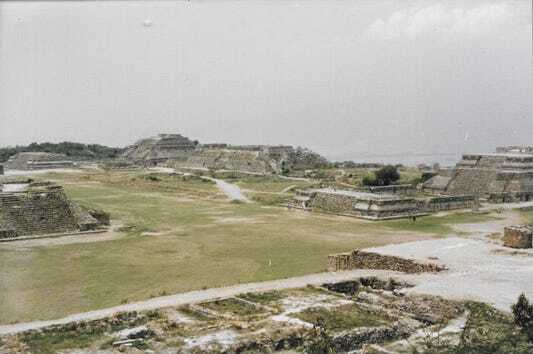 Mexico (1988). Photo by author.
Mexico (1988). Photo by author.Planetary Boundaries, Narrative Management, and Technology
As I continue to work on Part 4 of my multipart Contemplation regarding energy blindness (see: Part 1 Medium, Part 2 Medium, Part 3 Blog Medium), I offer a handful of recent comments I shared on a variety of posts I’ve been reading:
One posted to a Degrowth Group I am a member of:
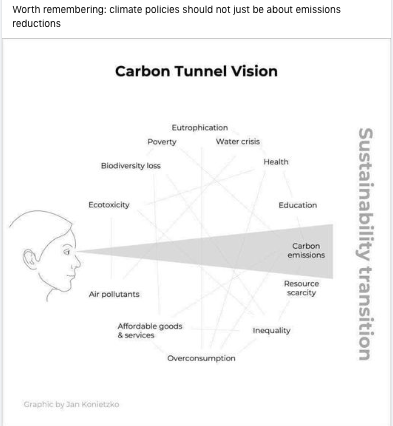
AP: It is the carbon risk that is existential. All the others are nice to have after you have reduced the carbon risk. Don’t allow this sort of propaganda to divert or dilute the required focus.
CS: obviously emissions are a significant threat but when we focus on climate change as the most significant we end up, as the majority currently do, looking to technology for solutions. Ecological overshoot is the master predicament. This means degrowth in energy and material consumption (less technology) and population reduction should be the key ways forward.
I highly recommend this talk by Bill Rees of Ecological Footprint fame. Cheers
https://youtu.be/QhhI9TF8K2k?feature=shared
MK: William R. Catton…
SE: Economic and then the following fertilizer/ pumped water/ food availability collapse as energy and materials slip away will tend to hurt us first. Many countries are already in the early stages of collapse. Lebanon, Argentina, Pakistan, etc.
Me: There are a number of planetary boundaries that have been broached because of our ecological overshoot. They all pose an existential risk and a number have been identified as being worse off than carbon emissions…the focus needs to be on all of them.
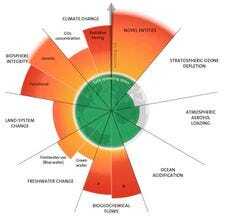
There’s this one on an oilprice.com article posted in the Peak Oil Facebook Group I am a member of:
Me: I have to wonder about the ‘accuracy’ of the article and its ‘conclusions’ (well, actually, prognostications as it’s about possibilities, not actualities). Bloomberg and Reuters, the two mainstream media outlets cited, are both extremely Western-biased. And we know the West would love to see cracks in the BRICS growing alliance so why not float the ‘news’ that such divisions are appearing based, naturally, on unnamed/anonymous sources. If we have learned anything from the recent decades of mainstream media reporting, it is that it has become little more than a propaganda arm for our ruling elite…
And this one in the same group:
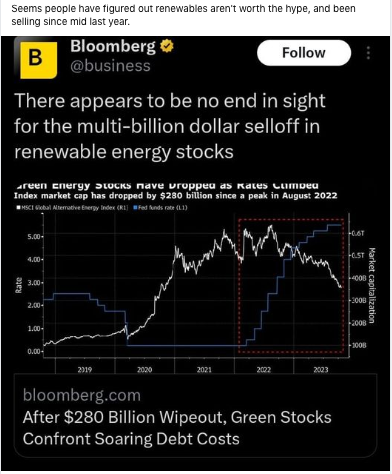
Me: Just as fracking was, the profit-makers/-takers have spun several narratives to entice investments — both capital and retail. Believers have, once again, trusted the untrustworthy and fallen for the con failing to understand that our energy-intensive living has never been sustainable on a finite planet regardless of our ingenuity and technological prowess. All we’re doing by chasing the unicorn of ‘renewables’ is expediting our journey over the energy cliff while contributing evermore to our ecological overshoot. Sad on so many levels.
LM: totally agree with that. The question is…what’s next
Me: Economic collapse. Rise of authoritarian/totalitarian government. War. Increasingly degraded ecological systems. Destitution for more and more people. See these: https://stevebull-4168.medium.com/todays-contemplation-collapse-cometh-lix-800413db180a ; and, https://stevebull-4168.medium.com/todays-contemplation-collapse-cometh-lxxxv-ffe437ffd811 .
My question posted in this group:
Wonder how long it will take for the discussions about Peak Oil to go fully mainstream once the Strait of Hormuz is closed off???
Comments:
SH: I expect the many manifestations of natural limits will likely end up being used as vehicles for scapegoating, to promote non-sequitur ideological agendas, and with examples of Overshoot being seen as isolated phenomenon, rather than part of a broader problem. People are already seeing global climate that way, so it stands to reason that Peak Oil will just give them one more thing regarding which they can petition governments and big corporations to solve for them. I have yet to encounter a climate activist who has seriously considered what people can do to address the problem by way of changing personal behaviors, as opposed to technological fixes and policy changes offering a “plug and play” solution. The notion of a wicked problem in which mitigation might involve a paradigm shift in collective behaviors and expectations is not on anyone’s radar.
Me: Yes, I agree that all sorts of narratives will be constructed — especially by the ruling elite and associated profit-makers/-takers — to leverage our energy fall/descent in advantageous ways to their goals. They will certainly be a lot of ‘othering’ going forward as our ‘leadership’ attempts to deflect blame/responsibility/focus on them and their wayward ways.
LM: predicament
DI: We blame the symptoms not the disease.
Me: True enough. A lot will be blamed on those ‘undemocratic/despotic’ regimes that are keeping us from their hydrocarbons…you know, because they ‘hate our freedom’.
SMK: It will never go mainstream. Anything but it will be blamed for conserving of remaining reserves: climate change [sic], unfolding warfare in Middle East, Biden falling down some steps, Swift and Kelce, whatever…NEVER peak oil.
Me: Perhaps. There are and have been a growing number attempting to raise the concept and implications of Peak Oil but as will likely continue to be the case the ‘influential’ narrative managers of society (those that work on behalf of the world’s elite and can shout through our politicians and mainstream media outlets) will continue to weave their competing stories, especially those flaunting human ingenuity and technological ‘solutions to our dilemma. That is, until the truth of PO and the insanity of chasing infinite growth on a finite planet are eventually so obvious that they can no longer be pushed to the margins and the saner voices of warning begin to turn more and more heads; not all, probably not even a lot, but I wager to guess at least increasing numbers.
I don’t believe our ruling elite will ever admit to PO and the inadvisability of chasing the perpetual growth chalice or turn towards degrowing our existence for that would mean removing the gravy train that provides their revenue streams and thus positions of power/influence and prestige. No, they will likely insist on the path of exacerbating our Overshoot while getting their propagandists to double/triple down on the tales of a technologically-based transition to a ‘clean/green’ utopia.
I think we can see part of the narrative plan going forward is to highlight the concept of Peak Demand as opposed to Peak Supply. Demand for hydrocarbons has peaked because everyone is already transitioning to the ‘Electrification of Everything Plan’ with their electric vehicle purchases and investments in non-renewable, renewable energy-harvesting technologies…only the reality indicates that this tale is nonsense and hydrocarbon extraction and use is increasing along with these technologies resulting in an exacerbation of our overshoot predicament.
Throw our currently increasing morass of geopolitical gamesmanship on top of an already deadly dead-end trajectory and that jump off the Seneca Cliff of energy decline seems further and further in the rear-view mirror — along with all the ecological systems destruction we can’t help but compound in our desire to control our destiny.
But, yeah, let’s all go see the Taylor Swift movie to deny the death of our world just a bit longer and sing along, holding hands as gravity takes hold. Such is the way of these story-telling apes who will do and believe almost any and everything to avoid/deny reality and the anxiety-provoking thoughts it raises.
October 21, 2023
Some Call It Conspiracy Theory – Part 1
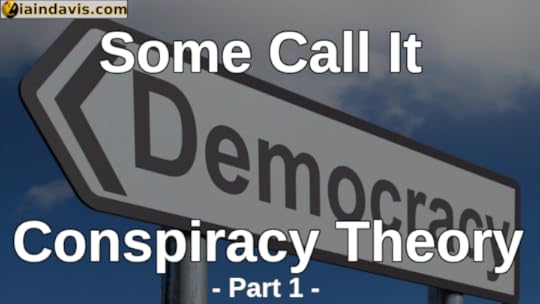
There are certain assumptions that are applied to anyone labelled a “conspiracy theorist”—and all of them are fallacies. Indeed, the term “conspiracy theory” is nothing more than a propaganda construct designed to silence debate and censor opinion on a range of subjects. Most particularly, it is used as a pejorative to marginalise and discredit whoever challenges the pronouncements and edicts of the State and of the Establishment—that is, the public and private entities that control the State and that profit from the State.
Those of us who have legitimate criticisms of government and its institutions and representatives, who are therefore labelled “conspiracy theorists,” face a dilemma. We can embrace the term and attempt to redefine it or we can reject it outright. Either way, it is evident that the people who weaponise the “conspiracy theory” label will continue to use it as long as it serves their propaganda purposes.
One of the most insidious aspects of the “conspiracy theory” fabrication is that the falsehoods associated with the term have been successfully seeded into the public’s consciousness. Often, propagandists need do no more than slap this label on the targeted opinion and the audience will immediately dismiss that viewpoint as a “lunatic conspiracy theory.” Sadly, this knee-jerk reaction is usually made absent any consideration or even familiarity with the evidence presented by that so-called “lunatic conspiracy theorist.”
This was the reason why “conspiracy theorist” label was created. The State and its propagandists do not want the public to even be aware of inconvenient evidence, let alone to examine it. The challenging evidence is buried under the “wild conspiracy theory” label, thereby signalling to the unsuspecting public that they should automatically reject all of the offered facts and evidence.
There are a number of components that collectively form the conspiracy theory canard. Let’s break them down.
…click on the above link to read the rest…
De-Dollarization? China Completes First Digital Yuan Purchase For Cross-Border Oil Transaction
De-dollarization continues accelerating with news of the Shanghai Petroleum and Natural Gas Exchange (SHPGX), a Chinese-backed exchange for trading energy-related products, settling its first cross-border transaction in digital yuan.
Chinese-based financial news outlet “Yicai” first reported PetroChina International bought one million barrels of crude oil using digital yuan on Thursday. It was the exchange’s first overseas oil settlement in digital yuan. However, the name of the seller was not disclosed.
SHPGX has made several transactions in yuan earlier this year: In March, PetroChina and TotalEnergies completed a yuan-denominated liquefied natural gas transaction on the exchange. According to the exchange, four such LNG transactions have occurred this year.
China’s central bank began the digital yuan project in 2014 and has piloted the electronic currency in numerous regions across China. The world’s second-largest economy has been preparing to use the yuan and its digital version in international trade and finance as an alternative to the dollar.
In August, Brazil’s President Luiz Inacio Lula da Silva called for BRICS nations to create a common currency as the world furiously searches for ways to circumvent the dollar-based financial system.
Brazil’s president said a BRICS currency “increases our payment options and reduces our vulnerabilities.”
The US shutting Russia out of the SWIFT messaging system that underpins most global payments in response to its invasion of Ukraine has supercharged the de-dollarization trend.
It remains to be seen who exactly PetroChina paid digital yuan for the crude oil, but it might not be out of the question that it was Russia, considering it’s been shut out of the SWIFT system, plus oil exports to China have hit a record high.
October 20, 2023
The System Isn’t Designed to Help You
If climate change doesn’t kill you, it will bankrupt you.
It’s been about two months since the Lahaina fire, and the long term nature of their recovery is just starting to set in — for some at least. I know from first-hand experience that it takes months for some people to emerge enough from the fog of trauma to even start thinking about recovery.Personally, I don’t like the word “recovery”.
It makes it sound like things can — and do — go back to the way they were before the fire (or the hurricane or the flood — pick your own mass climate disaster).
But they don’t. They can’t. Lahaina is gone. Forever.
Sure, something will come back — probably cookie-cutter multi-million dollar condos that the former residents can’t even dream of affording. But Lahaina is gone. Its residents can move forward, but they can’t “recover”. There is no going back.
And “moving forward” itself a long and cruelly painful process, and one during which I personally came to understand that the “system” — everything from FEMA to insurance companies to the tax system to banks to the government to the legal system — isn’t designed to help you, the disaster victim.
It isn’t that the system doesn’t work. It works exactly as designed.
But it’s just not designed to help you.
It helps others, or maybe no one at all, but if you manage to get what you need from the system, it’s almost by accident, or unintentional, or a byproduct of helping someone else.
I know a lot of people reading this will say, “you’re overreacting” or “you just had a bad experience”. I know that because I’ve been told this before by people who have never been through a climate disaster and who are just repeating the reassuring platitudes that we’re all programmed to repeat.
…click on the above link to read the rest…
Today’s Contemplation: Collapse Cometh XVI–Finite Energy, Overconsumption, and Magical Thinking Through Denial
May 24, 2021
 Knossos, Greece (1993) Photo by author
Knossos, Greece (1993) Photo by authorFinite Energy, Overconsumption, and Magical Thinking Through Denial
Another quick thought on our impending energy cliff situation and comment on an article suggesting overconsumption is our greatest threat and that we can be happy without it.
This is an excellent article.
The threats humanity faces are never simple and always multifaceted and intertwined. Overconsumption by a relatively small percentage of our world’s population is certainly one of the contributing factors. As is the way we create and distribute ‘money’ and our sociopolitical systems, to mention just two.
Underpinning all of these complexities is energy and the one-time, finite cache of energy provided by fossil fuels has provided a boost to human exploitation of the planet unlike any other time in humanity’s 100,000+ years of existence. In the waning days of this phenomenal energy surplus (be it due to supply constraints because of diminishing returns or some recognition of the negative consequences of its use — which are many and go far beyond the production of greenhouse gases), scaling back ‘advanced’ economies’ overconsumption tendencies could help forestall the energy decline we have begun to experience. It is unlikely, however, to prevent it — I would argue it is mostly magical thinking to hold on to the idea that some ‘clean’, ‘renewable’, and ‘sustainable’ energy source will suddenly appear and save us; a ‘solution’ that would not in any way address the mountain of other dilemmas we face, such as lack of arable lands and fertile soils, biodiversity loss, the negative repercussions of our past several centuries of expansion and exploitation, and numerous other biophysical limits imposed by a finite planet.
In fact, I would argue there are many reasons a pullback in our consumer-(profit-)driven societies is unlikely to happen, not least of which is the ruling class’s motivation to expand/control the wealth-generating systems that provide their revenue stream and the societal repercussions that always seem to arise when a people’s living standards (expectations? entitlements?) are threatened.
Another, and perhaps the most significant, roadblock to ‘righting’ our path is the somewhat dominant narrative that alternative energy sources (that many erroneously label ‘green’ and ‘clean’; and are used as supportive fodder by the ruling class to justify ‘sustainable’ growth — a perverse oxymoron if ever there was one and truly more marketing sloganeering than a reflection of reality) can be mostly easily transitioned to in order to continue ‘fuelling’ advanced economies very energy-intensive lifestyles. As long as the illusion persists that our current ways of living (and I’m speaking of ‘advanced’ economic societies) can in any way be ‘sustained’, we will travel towards a collapse/decline which can neither be reversed nor managed in an equitable or relatively-non-catastrophic way (‘catastrophic’ for advanced economies, not so much for economies that don’t have the same expectations and/or are more self-sufficient, and for much of the rest of the ‘natural’ world).
This is the way things go for a species that has overshot the natural carrying capacity of its environment. Humanity has the unique abilities to be aware of and possibly mitigate the fall that accompanies this biological phenomenon but I am doubtful we will use our ‘ingenuity’ to do anything but take the easier and seemingly less painful path of attempting to maintain our current tendencies (we are, after all, genetically predisposed to seek pleasure and avoid pain, even if the pain experienced now were to be significantly less than that that is to arise somewhat later in time). We will continue to use all the cognitive distortions we are prone to to propagate and hold on to comforting narratives that avoid the inconvenient ‘facts’.
Of course, denial is the first stage of grief and often, if not always, accompanies a significant loss. We, however, need the majority of people to move directly to the final stage of grief that is acceptance and as I have often argued on these pages recognise (and posthaste given the speed with which exponential growth always overwhelms a system) that the best way to mitigate our impending energy descent (and that of other physical resources) is to pursue degrowth strategies. The conversation on how to do this equitably and wisely is long, long overdue and the longer we avoid it, the more precipitous will be our ‘fall’.
In fact, it may actually be too late as some suggest and all the arguments and competing narratives are just ‘academic’ at this point — we would only truly know in hindsight. Perhaps the best one can do is to try and make one’s household and local community as resilient and self-sufficient as possible. It is sometimes wise to plan for the worst and hope for the best; although hope is not really a strategy and the planning/action part is what’s really important. Yes, stop consuming as much and change your expectations but also be prepared for a future of less and not one of perpetual growth and prosperity as our ruling class pushes (what politician has not promised ‘more’ to garner support? as the article highlights). ‘Normal’ is what we make it, not what we are told by others — especially those who seek to ‘profit’ from us. It is going to take a massive paradigm shift for us to weather the impending energy cliff and we are quickly losing time to prepare, both physically and psychologically.
Today’s Contemplation: Collapse Cometh XV–Finite Energy, ‘Renewables’, and the Ruling Elite
May 21, 2021
 Rome, Italy (1984) Photo by author
Rome, Italy (1984) Photo by authorFinite Energy, ‘Renewables’, and the Ruling Elite
Energy. It’s at the core of everything we do. Everything. Yet we take it for granted and rarely think about it and what the finiteness of our various energy sources means for us.
As Gail Tverberg of Our Finite World concludes in a recent thought-provoking article that should be read widely: “Needless to say, the powers that be do not want the general population to hear about issues of these kinds. We find ourselves with narrower and narrower news reports that provide only the version of the truth that politicians and news media want us to read.”
Instead of having a complex and very necessary discussion about the unsustainable path we are on (especially as it pertains to chasing the perpetual growth chalice) and attempting to mitigate the consequences of our choices, we are told all is well, that ‘science’, ‘human ingenuity’, and ‘technology’ will save the day, and we can maintain business-as-usual with just some minor ‘tweaks’ and/or a ‘green/clean’ energy transition. Pre/history, physics, and biology would suggest otherwise.
Here is my relatively long comment on a Tyee article discussing the International Energy Agency’s recent report that calls on all future fossil fuel projects to be abandoned and drastic reductions in demand in order to avoid irreparable climate change damage to our planet. The answer, however, will not be found in ‘renewable’ energy and related technologies as many contend because the underlying and fundamental issue of overshoot has been conveniently left out of the story.
Having followed the ‘energy’ dilemma for more than a decade I’ve come to better understand the complexities, nuances, and scheming that it entails; not all mind you, not by a long shot, but certainly better than the mainstream narratives provide. I have no incentive to cling to a particular storyline, none. I have discovered the following information through continued reading and questioning. My perspective on almost everything has shifted dramatically as a result — one cannot unlearn certain things once they’ve been exposed to them.
One has to ask oneself a few questions and keep in mind a number of facts when putting the puzzle together as to what exactly is going on; and energy applies to many, many issues in our world far, far beyond climate change because it is the fundamental basis of life and all this entails. I won’t/can’t post everything since it would involve a massive text, but here are a few pertinent issues to consider in the energy story and our fossil-fuel future.
First, fossil fuels are indeed a finite resource so their coming decline in use was inevitable. This is not only because they are finite but because of falling energy-return-on-energy-invested (EROEI). Given our tendency to exploit the low-hanging fruit first (use up the easy-to-access and cheapest-to-retrieve), the law of declining marginal utility (also known as diminishing returns) was destined to occur and our use of them diminish significantly. We now have to rely upon oil sands, tight oil, and deep-sea drilling to sustain or just barely improve extraction rates. This is not only not economical because of the complexities involved, but uses up increasing amounts of the energy extracted (to say little of the environmental impacts).
The energy industry and governments have known about this predicament for decades. It is not a surprise at all (several ‘research’ reports by government agencies/bureaucrats over the years are available that discuss the issue; to say little about the ‘academic’ discussions). Geophysicist Marion King Hubbert projected this situation while working for the Shell Oil Company in the mid-1900s and developed the Peak Oil Theory, which has more-or-less been quite accurate in its predictions, especially for conventional crude oil production. Given that the largest and most profitable conventional crude oil reserves have all been found and exploited, and the increasing costs and diminishing returns of alternative methods of extracting oil and gas, it’s really not surprising that the industry has greatly reduced capital expenditures in exploration and instead ventured into alternatives; there is little additional profit to be made in oil and gas — better to move to other energy sources and market them as a panacea that will not only address climate change but support our energy-intensive living standards. This dilemma is also outlined in the 1972 text Limits to Growth that used emerging computer simulations to explore various scenarios given the fact that we live on a planet with finite resources. Of the various models generated, we seem to be tracking most closely the Business-As-Usual one that projected problems arising for humanity as we entered this century (and peaking around 2050); problems/dilemmas due to a variety things, not least among them the consequences of population overshoot.
Second, transitioning to alternative sources of energy is not a simple nor straightforward shift; not even close. We have created a complex, interlinked world almost entirely dependent upon fossil fuels. This one-time, finite cache of energy reserves has underpinned virtually our entire ‘modern’ way of living. From the ability to create a complex energy-averaging system via globalised, long-distance trade routes to industrial agriculture that feeds our billions (some quite well, others not so much), oil and gas makes it possible. There are no alternatives that can replace fossil fuels for a number of reasons but mostly because many of our necessary industrial and extraction processes must use fossil fuels since alternatives are inadequate — and alternatives all rely upon these processes for their production, distribution, and maintenance. Rather than acknowledge this dilemma, we have crafted a narrative that such a transition is not only possible but will more or less be forced upon humanity for its own good (more on why I believe this is so below).
Much of our geopolitical and economic chaos over the past number of decades can be tied directly to our energy issues as well. Maneuvering by various nation states, in the Middle East especially, has a link to the massive fossil fuel reserves that have been discovered around the planet. Alliances with questionable governments and proxy wars with competing nations has been the storyline for some years now as access to and control of oil and gas reserves (among other important resources) has been paramount. The untethering of our currency to physical commodities (i.e., gold and silver) in the late 1960s and early 1970s (especially the abrogation of the Bretton Woods Agreement by the United States), and subsequent ever-increasing debasement of it, can be said to be one of the consequences of diminishing returns on our most important energy sources and attempts to counteract the energy decline — especially in the US where oil and gas production peaked about this time. Geopolitics is mostly if not always about control of resources, not about freeing a nation’s citizens from its tyrannical government and bringing ‘democracy’ to them — we chose which ‘tyrants’ we support and which we vilify (even within our own ‘democracies’).
Finally (although I could ramble on forever), the ruling class/oligarchs/elite (whatever you wish to term the power brokers and wealthy in society) have one primary motivation that drives them: the control/expansion of the wealth-generating systems that provide their revenue streams — this has been the story of the ruling classes throughout pre/history. All other concerns either serve this first one or are secondary/tertiary. Energy is one of the most profitable of the various wealth-generating systems (control of the creation and distribution of fiat currency perhaps the most; along with taxing powers). What better way to ensure continued wealth generation than convincing everyone that a shift to alternative energy sources is necessary to save ourselves and planet, even if such a shift is impossible and untenable.
We cannot mitigate, let alone solve, the issues at hand for humanity and the planet if we do not correctly identify the cause(s). Clinging to a narrative that is primarily marketing propaganda might help to reduce the cognitive dissonance created by holding two or more beliefs that conflict with each other, but it does zero in addressing our needs. Holding on to the hope that we can continue to live as we have because ‘someone’ will solve these conundrums is in my opinion misplaced faith.
Our major dilemma is overshoot, defined simply as the point where a species has placed more demand on its environment/ecology than that system can naturally regenerate and sustain the population. The one-time cache of fossil fuels has allowed our species to proliferate (and helped to provide amazing wonders) well beyond the natural carrying capacity of our planet. And now that it is in terminal decline nature is sure to bring our species’ population back into alignment. Those at the top of society’s power structures are well aware of these issues for they have driven most of their actions and policies for decades. It is far better for them, however, if the masses are focused elsewhere and their use of propaganda to do this has a long history as well. We are being sold a comforting narrative about ‘clean/green’ energy while the underlying reality of what is occurring is being purposely ignored or dismissed, often as conjecture or conspiracy. The idea that we need to reduce our fossil fuel use to save the planet is convenient cover for the truth that fossil fuels are becoming too expensive to retrieve because the cheap-to-access and easy-to-retrieve reserves are quickly running out.
I’m increasingly doubtful we are going to face the ultimately very difficult decisions that need to be made (in fact, needed to be made decades ago) and we will continue to stumble along hoping and praying that all will work out just fine, thank you. Only time will tell how this all plays out for none of us can accurately predict the future but the path of decline/collapse seems fairly certain. Every complex society that has existed up to this point in history has experienced it and we are not significantly different when push comes to shove. If archaeologist Joseph Tainter’s thesis in his monograph The Collapse of Complex Societies is accurate, complex societies ‘collapse’ due to the inability to deal with stress surges because they have been experiencing diminishing returns on their investments in complexity; and this is exactly the situation with humanity’s investments in fossil fuels.
This is what I have been able to cobble together in the couple of hours of a few household chores and while enjoying my morning coffee. Now I will prepare to spend my usual day out and about our yard enhancing our fruit/vegetable gardens, and attempting to make our household a tad more resilient in light of the decline that is most assuredly upon us. You may or may not agree with my interpretation of things but I would implore you to explore the issues and certainly step outside of your comfort zone and consider a different paradigm because the ones pushed by the ruling class are not in your best interest.




